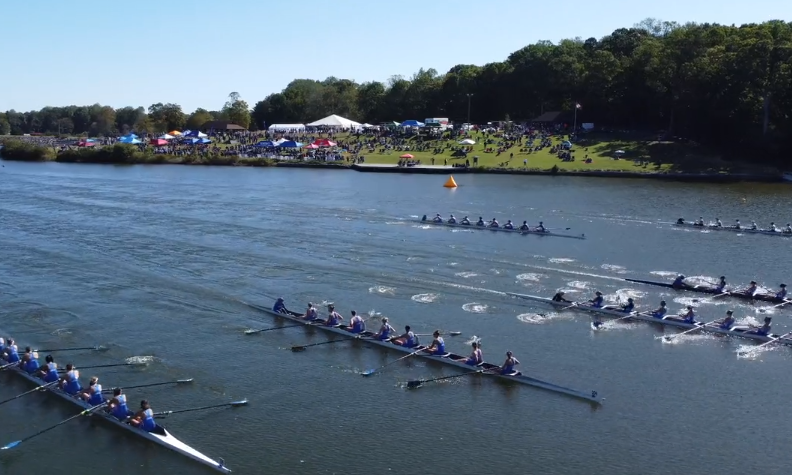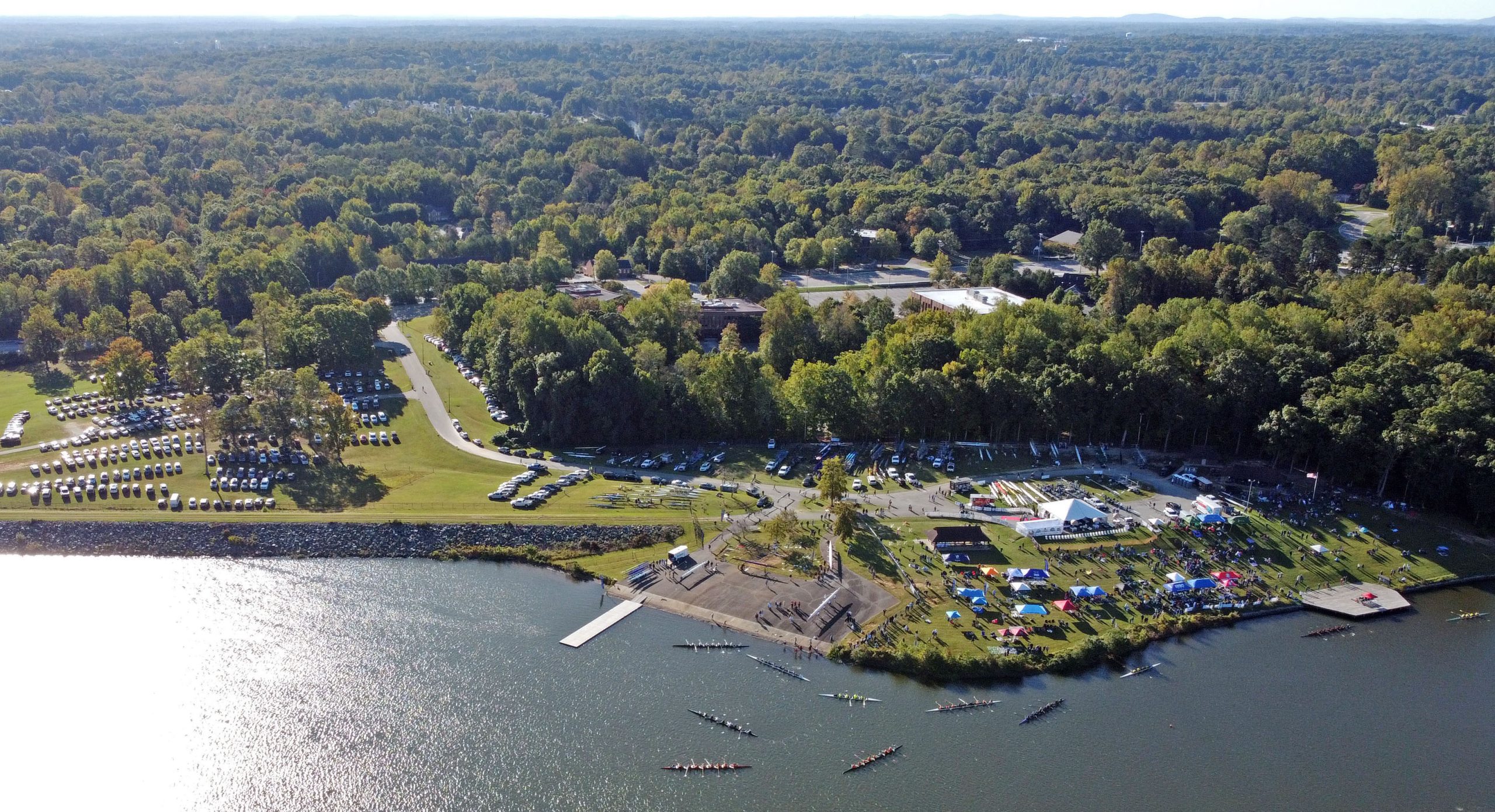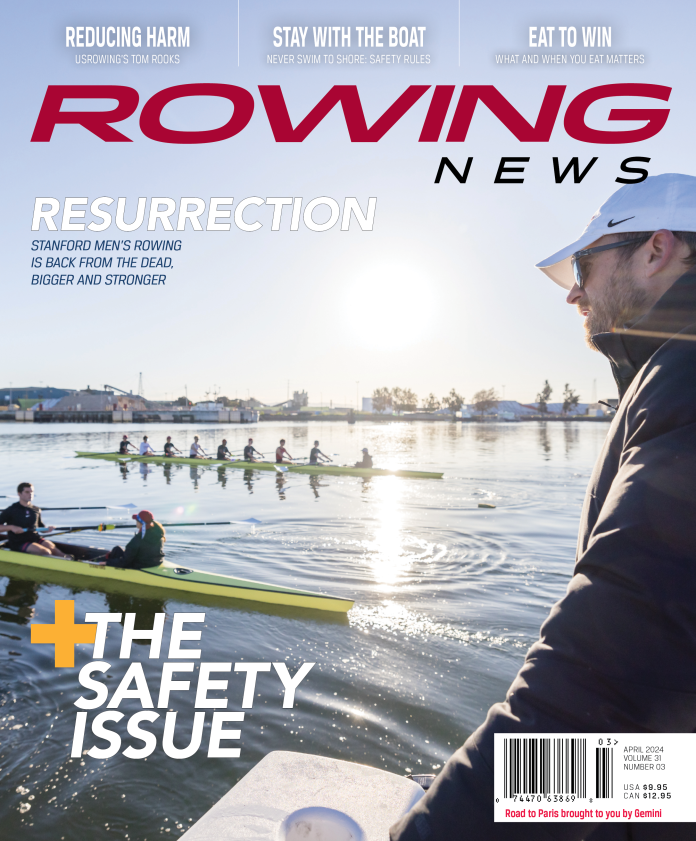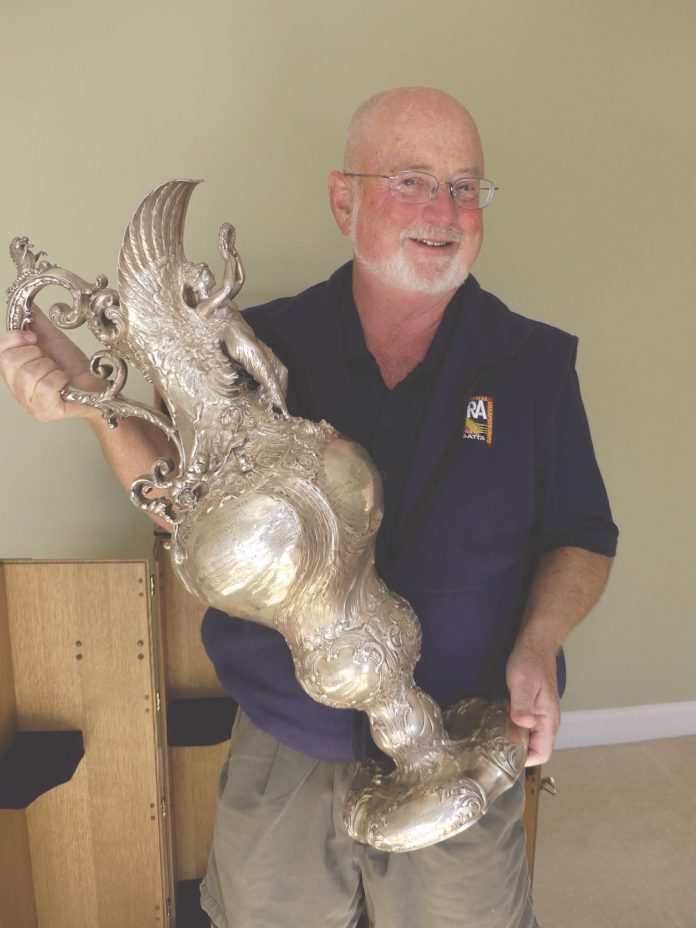North Carolina Rowing Championships Attracts Record Entry
Oak Hollow Lake in High Point, N.C. will host 443 crews for the North Carolina Rowing Championships, Saturday, April 20, making the Tar Heel State the latest hotspot of growth in the sport.
“It’s juniors, middle school, high school, colleges, and masters,” says organizer Gene Kininmouth of the one-day regatta. “We’re going to be at capacity for our venue. People really want to come to this regatta.”
Raced on a buoyed 1,500-meter course with static refereeing, the regatta has exploded in popularity since its founding 10 years ago.

“What really makes the regatta a success is coaches know exactly what they’re getting into because every race is a straight final,” says Kininmouth. For events with more entries than lanes, organizers create multiple divisions and rowers can race two or more events. “It’s really coach-friendly, really athlete-friendly.”
Last year’s event drew 338 entries. Kininmouth says the regatta doesn’t plan to expand to multiple days. But the demand could be there. This year, the Southern Intercollegiate Rowing Association’s championship regatta is the same weekend in Oak Ridge, Tenn., drawing 233 crews from 44 schools, crews who might otherwise race in the North Carolina Rowing Championships, which is open to crews from outside the state.
“In the southeast we do a lot more small-boat racing then probably other parts of the country because we have warmer water and we don’t have the history and tradition” of racing only eights and coxed fours, says Kininmouth.

The North Caroline Rowing Championships feature The Lenny Peters Regatta Lounge, offering single-price admission to an enclosed spectating area serving morning coffee and pastries, sit-down hot lunch, champagne, beer, wine, and cocktails.
“I’m pretty happy with how it’s worked out,” says Kininmouth. “I don’t know that I ever want to be a two day regatta or have it more than 440 but I’ll probably have maybe have a different opinion after this weekend.”

Races to Watch: April 19-21
Big Ten Invite: Racing has already started in Sarasota for the biggest collegiate women’s race of the weekend, the Big Ten Invite, where 18 teams are facing off. Four top-20 teams, #9 Michigan, #13 Duke, #15 Rutgers, #16 Indiana, will lead the charge in this deep field while bubbles schools, like Tennessee, led by new head coach Kim Cupini, are looking to make a strong statement to the selection committee that they deserve an invite to the NCAA Championships. Racing is live streamed here and full results will be posted here.
North Carolina Rowing Championship: Boasting 445 entries and over a thousand competitors, the 2024 Bethany Medical North Carolina Rowing Championships takes place this weekend in High Point, NC. Already featured in Rowing News, the event will attract junior, collegiate, and masters crew from across the region while also providing a top-tier viewing experience. Spectators can enjoy food trucks, a beer garden, and even a Best in Show Dog competition, in addition to North Carolina largest regatta of the year. The schedule is posted here and results can be found here.
Cal-UW Dual: The Cal men and women welcome Washington to Redwood Shores this weekend in one of rowing’s oldest and strongest rivalries. #2 Cal men will host the #3 Washington men in the 112th-meeting of these two teams. The #4 Bears will take on the #7 Huskies on the women’s side, carrying on a series that dates back to 1977. All races will be live streamed and live results can be found here.
Final Ten Crews Emerge at U.S. Olympic & Paralympic Team Trials
The U.S. Olympic and Paralympic Trials decided the remaining eight of the 14 crews that either are qualified already or hoping to qualify for this summer’s Olympic Games, as well as two Para boats for the Paralympic Games.
Single sculler Kara Kohler and the men’s and women’s pairs of Oliver Bubb and Billy Bender and Jess Thoenness and Azja Czajkowski will race in Paris by virtue of winning Olympic trials in the previously qualified boat classes.
The winning men’s and women’s quads, men’s single, men’s lightweight and open doubles, and the Para PR1 men’s single and PR2 mixed double all now go to Lucerne, Switzerland, for the World Rowing Final Olympic & Paralympic Qualification Regatta, May 19 to 21, where they will have to finish in the top two to earn places for Paris.
“It’s a relief,” said Kohler, after winning the singles trial against Community Rowing, Inc.’s Maggie Fellows, who had won the winter speed order in February on the same Nathan Benderson Park course in Sarasota, Fla.
Kohler, fourth at last year’s world championships, will become a three-time Olympian, having won a bronze medal in the women’s quad in London and finished ninth in the single in Tokyo. Fellows goes home, having chosen to pursue the single to the end rather than accept an invitation to selection camp for the quad.
“That’s a hard case,” said USRowing head coach Josy Verdonkschot. “In the end, it’s a personal decision.” But the Olympic chief would have liked to have had the talents of Fellows in the mix for the women’s quad.
“It’s not like a computer game, where you can move everybody in the desired direction. Looking at it from her perspective, the part that I totally understand is she was going for a qualified spot.”
The winning pairs were athletes who were cut unexpectedly from the fours and eights, especially since less-accomplished rowers who placed below them in the February pairs speed order were selected instead. Although both pairs won the trials by open water, they weren’t cut from the big boats to make great Olympic pairs. Once that happened, though, they were guided in their choices of partners for the trials.
“We tried to help athletes who didn’t make big boats decide about combinations to make sure we gave our best athletes the best opportunity,” said Verdonkschot.
Craftsbury Green Racing Project’s Jacob Plihal won the men’s single trial by three seconds over Saugatuck’s Casey Fuller, with Penn AC’s Cedar Cunningham third. The U.S. has not qualified the men’s single for the Olympics since 2012 (Ken Jurkowski, 24th), and the event is typically one of the most competitive at the final qualifier.
The men’s double of Ben Davison and Sorin Koszyk, who missed Olympic qualification at last year’s Worlds after a sloppy race in the quarterfinals, won the right to race at the final qualifier with a 35-second trials win over the only other entry of World Beach Sprint Finals champions Christopher Bak and Kory Rogers of Next Level Rowing.
The lightweight men’s double of Columbia University grad Sam Melvin and Dartmouth’s Cooper Tuckerman won its trial convincingly for the chance to qualify in Lucerne. The women’s lightweight double is one of eight already-qualified Olympic events for the U.S., and the crew of Michelle Sechser and Molly Reckford was named through the Olympic selection camp held in Sarasota in March.
The U.S. men’s quad that finished ninth at last year’s Worlds—only the top seven fours and quads qualified for the Olympics—won the only close final of the trials, beating the other U.S. Training Center/Penn AC combo quad by half a second.
The women’s quad of Lauren O’Connor, Teal Cohen, Emily Delleman, and Grace Jones won its final by over seven seconds and, like the men’s quad, will travel to Lucerne in an attempt to finish in the top two of the final qualifying regatta. In slow conditions—a light headwind but little chop—both quads raced to 91 percent of Verdonkschot’s “Competitive Standard Time,” a promising sign for Olympic qualification, if not medals.
Two Para boats raced unopposed at trials, with Andrew Mangan winning the right to race for Paralympic qualification in the PR1 men’s single scull and Russell Gernaat and Madison Eberhard going in the PR2 mixed double.
There were no entries for the PR1 women’s single, and the U.S. has already qualified and named crews for the other two of five Paralympic events, the PR3 mixed double and PR3 mixed four with coxswain.
The U.S. Olympic & Paralympic Team Trials concluded the series of training camps, February speed order, Olympic selection camp, and trials preparations at Nathan Benderson Park. The U.S. Olympic & Paralympic Committee will officially name the Olympic and Paralympic teams June 7 and July 1, respectively.
Caldwell to Retire From IRA
Gary Caldwell, the commissioner of the Intercollegiate Rowing Association (IRA), will retire at the end of the year after serving the oldest rowing organization and collegiate championship in the U.S. for 26 years, the IRA announced.
In 2020, Caldwell described the role of the IRA to Rowing News:
“Because men’s rowing and [men’s and women’s] lightweight rowing are not NCAA sports, the IRA acts as the regulating body, much as the NCAA does for women’s rowing. We oversee the eligibility rules, the operating regulations, an athlete’s ability to transfer between schools. We’re a parallel organization.”
Caldwell became involved with the IRA in the 1990s when he began administering events and eventually was appointed commissioner. When he retired from his coaching position at Tufts in 2016 after 26 years, he remained in the role.
The IRA began with five member schools—the University of Pennsylvania, Syracuse, Cornell, Columbia, and the Naval Academy. But in 2011, the organization restructured under a new constitution and bylaws and is governed now by a board of 51 member schools.
The IRA also announced that Laura Kunkemueller will move from director of officiating to the new position of associate commissioner. Patrick Diggins, regatta director for the IRA and Eastern Association of Rowing Colleges Eastern Sprints, will take on additional responsibilities as assistant commissioner for affiliate championships and will oversee the National Invitational Rowing Championship, New England Rowing Championships, and Women’s Sprints regattas.
Howard Meisner, longtime USRowing referee and former Northeast regional coordinator for USRowing’s referee committee, has been appointed director of officiating.
“I get to work with really good people; they are invaluable,” said Caldwell. “This is not a one-man band by any stretch of the imagination.”
Pocock CRCA Coaches Poll – Week 5
While the DI ranking remained relatively consistent, DII and DIII both saw some significant shakeups at the top in this week’s Pocock CRCA Coaches Poll. Embry-Riddle, on the strength of their performance at last weekend’s Knecht Cup, jumped from fifth to second in the DII poll while Wesleyan dropped from first to third in the DIII poll after losing to #1 Tufts, formerly ranked #2.
| Division 1 | |||
| Rank | Team | Points | Previous Ranking |
| 1 | Stanford University | 2503 | 1 |
| 2 | University of Texas | 2411 | 2 |
| 3 | Princeton University | 2263 | 3 |
| 4 | University of California, Berkeley | 2077 | 4 |
| 5 | Brown University | 2007 | 6 |
| 6 | Yale University | 1983 | 5 |
| 7 | University of Washington | 1783 | 7 |
| 8 | Syracuse University | 1666 | 8 |
| 9 | University of Michigan | 1601 | 9 |
| 10 | University of Pennsylvania | 1464 | 10 |
| 11 | University of Virginia | 1281 | 11 |
| 12 | The Ohio State University | 1213 | 12 |
| 13 | Rutgers University | 1143 | 15 |
| 14 | Duke University | 1132 | 13 |
| 15 | University of Tennessee | 1023 | 14 |
| 16 | Indiana University | 921 | 16 |
| 17 | Oregon State University | 715 | 17 |
| 18 | Harvard-Radcliffe | 303 | 18 |
| 19 | Washington State University | 297 | 19 |
| 20 | Columbia University | 249 | NR |
| ORV | University of Miami | 164 | |
| ORV | Gonzaga University | 137 | |
| ORV | University of Central Florida | 77 | |
| ORV | University of Southern California | 76 | |
| ORV | University of Iowa | 44 | |
| ORV | University of Notre Dame | 37 | |
| ORV | University of Minnesota | 33 | |
| ORV | University of California, Los Angeles | 30 | |
| ORV | University of Alabama | 25 | |
| ORV | Dartmouth College | 18 |
| Rank | Team | Points | Previous Ranking |
| 1 | University of Central Oklahoma | 194 | 1 |
| 2 | Embry-Riddle Aeronautical University | 145 | 5 |
| 3 | Cal Poly Humboldt | 143 | 2 |
| 4 | Seattle Pacific University | 106 | 3 |
| 5 | Mercyhurst University | 106 | 6 |
| 6 | Western Washington University | 98 | 4 |
| 7 | Rollins College | 53 | NR |
| 8 | Barry University | 30 | NR |
| ORV | Thomas Jefferson University | 18 | |
| ORV | Nova Southeastern University | 4 |
| Rank | Team | Points | Previous Ranking |
| 1 | Tufts University | 724 | 2 |
| 2 | Trinity College | 684 | 3 |
| 3 | Wesleyan University | 675 | 1 |
| 4 | Williams College | 588 | 6 |
| 5 | Bates College | 543 | 4 |
| 6 | Ithaca College | 428 | 8 |
| 7 | Hamilton College | 427 | 7 |
| 8 | Wellesley College | 406 | 5 |
| 9 | Worcester Polytechnic Institute (WPI) | 403 | 10 |
| 10 | Smith College | 347 | 9 |
| 11 | Clark University | 219 | 11 |
| 12 | William Smith College | 156 | 13 |
| 13 | US Coast Guard Academy | 141 | 12 |
| 14 | Rochester Institute of Technology | 91 | 14 |
| 15 | University of Puget Sound | 49 | 15 |
| ORV | Skidmore College | 47 | |
| ORV | Lewis & Clark College | 24 | |
| ORV | University of Rochester | 18 | |
| ORV | Bryn Mawr College | 9 | |
| ORV | Mount Holyoke College | 9 |
IRCA/IRA Coaches Poll – Week 2
The IRCA/IRA Coaches Poll – Week 2 has been released, with Harvard holding on to the top spot in the both the DI Heavyweight and Lightweight Varsity Eight polls, while Wesleyan still sits atop the DIII rankings.
| IRCA/IRA Men’s Heavyweight Varsity 8 Poll | |||
| 4/17/24 | |||
| Rank | Team (First Place Votes) | Points | Previous |
| 1 | Harvard University (9) | 297 | 1 |
| 2 | University of California – Berkeley (3) | 284 | 2 |
| 3 | University of Washington | 282 | 3 |
| 4 | Princeton University | 259 | 4 |
| 5 | Yale University | 251 | 5 |
| 6 | Brown University | 240 | 6 |
| 7 | Syracuse University | 228 | 7 |
| 8 | Northeastern University | 223 | 8 |
| 9 | Dartmouth College | 198 | 10 |
| 10 | University of Pennsylvania | 196 | 9 |
| T-11 | Stanford University | 172 | 11 |
| T-11 | US Naval Academy | 172 | 12 |
| 13 | Boston University | 157 | 13 |
| 14 | Cornell University | 143 | 14 |
| 15 | University of Wisconsin | 134 | 15 |
| 16 | Drexel University | 108 | 19 |
| 17 | Columbia University | 106 | 16 |
| 18 | Georgetown University | 102 | 17 |
| 19 | La Salle University | 90 | 18 |
| T-20 | Oregon State University | 58 | 21 |
| T-20 | University of California – San Diego | 58 | 20 |
| 22 | Temple University | 47 | 23 |
| 23 | Holy Cross | 46 | 22 |
| 24 | Jacksonville University | 18 | NR |
| 25 | Colgate University | 15 | T-24 |
| Others Receiving Votes: Gonzaga University (8), University of San Diego (6), Massachusettes Institute of Technology (2) | |||
| IRCA/IRA Men’s D3 Varsity 8 Poll | |||
| Rank | Team (First Place Votes) | Points | Previous |
| 1 | Wesleyan University (3) | 73 | 1 |
| 2 | Trinity College (2) | 72 | 2 |
| 3 | Tufts University | 65 | 3 |
| 4 | Williams College | 57 | 6 |
| 5 | Bates College | 56 | 5 |
| 6 | Worcester Polytechnic Institute | 45 | 4 |
| 7 | US Coast Guard Academy | 38 | 11 |
| T-8 | Hamilton College | 36 | 7 |
| T-8 | Marietta College | 36 | 9 |
| 10 | Ithaca College | 32 | 10 |
| 11 | Colby College | 30 | 8 |
| 12 | Catholic University of America | 23 | 14 |
| 13 | St. Mary’s College of Maryland | 11 | NR |
| T-14 | Adrian College | 6 | 15 |
| T-14 | Rochester Institute of Technology | 6 | NR |
| T-14 | Skidmore College | 6 | T-12 |
| Others Receiving Votes: St. Lawrence University (4), Union College (2), Franklin & Marshall (1), Washington College (1) | |||
| IRCA/IRA Men’s Lightweight 8 Poll | |||
| Rank | Team | Points | Previous |
| 1 | Harvard University (10) | 100 | 1 |
| 2 | Princeton University (1) | 89 | 2 |
| 3 | Cornell University | 82 | 3 |
| 4 | University of Pennsylvania | 74 | 4 |
| 5 | US Naval Academy | 65 | 5 |
| T-6 | Georgetown University | 44 | 7 |
| T-6 | Columbia University | 44 | 10 |
| 8 | Yale University | 41 | 6 |
| 9 | Massachusettes Institute of Technology | 37 | 9 |
| 10 | Dartmouth College | 19 | 8 |
| 11 | Mercyhurst University | 10 | 11 |
Three Keys to Success
Rowing is a beautiful, elegantly simple sport: The first boat across the line wins. There are no judged points, no time-outs, and no substitutions. We race to win, with no room for debate about the result, which is decided on the water.
Off the water, coaches should leave plenty of room for debate, especially regarding non-rowing matters. A coach is a teacher, and most rowers are student-athletes. Our sport is but one part of a person’s development as a member of society, and as Madeline Davis Tully points out in her Coaching Development column on page 63, coaches should create a welcoming environment for rowers of all kinds by not taking a stand on the social issues that have distracted so many in our sport from the actual rowing over the past few years.
Now–spring and summer–is when our races matter, when the trophies are awarded, and when championships are determined, by racing and by crossing the line first.
A lot goes in to the roughly 260 strokes it takes to cover the 2,000 meters of these victories and championships. Hours of training over the four years of a school career—or the eight or more years of an Olympic journey—are behind each and every stroke of a six-minute race.
Only one crew gets to be the best at the final regatta, and what all the best have in common are three keys to success: great athletes guided by great coaches with great organizational support. In this issue, we feature two programs, one at each end of the years-long process of harnessing those elements to develop successful crews.
Deerfield Academy, a school as old as our country, found immediate success switching from racing in coxed fours to eights last year, but it came after years of building.
This year, on the NCAA Division I level, UCF is beginning the process, putting great organizational support behind a great coach, Mara Allen, in her first year of developing great athletes in Orlando.
Also this year, as pictured and explained in Big News, beginning on page 25, great U.S. athletes have won the opportunity to race against the world’s best rowers coached by great coaches with great organizational support at this summer’s Olympics and Paralympics in Paris.









